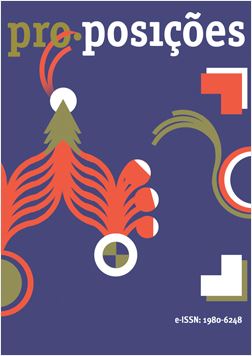Abstract
In this essay, I intend to build some educational reflections inserted in a world in transformation, in this historical moment that is being called "post-pandemic". Inspired by the mythical figure of the character of the Miguel de Cervantes’ book, I seek to understand, based in contemporary studies of the cognition, how Don Quixote creates a possible and real world for him from his interaction with the literary books of chivalry to, so, expanding this discussion, seek possible educational alternatives for this "post-pandemic" world. Thus, I intend, at the same time, to analyze the process of construction of the world of Don Quixote and to propose reflections on what could become a quixotic education.
References
Cervantes S., M. (2004). Don Quijote de la Mancha (Edición del IV Centenario). Real Academia Española: Asociación de Academias de la Lengua Española.
Duarte Jr., J. F. (2012). Por que Arte-Educação?. Papirus Editora.
Duque, P. H. (2015). Por uma abordagem ecológica da linguagem. Pontos de Interrogação, 5 (1), 55-78.
Fauconnier, G. & Turner, M. (2002). The way we think Basic Books.
Freire, P. (1994). Pedagogia do Oprimido Editora Paz e Terra.
Gerhardt, A. F. L. M. (2006). Uma visão sócio-cognitiva da avaliação em textos escolares. Educação e Sociedade, 27 (97), 1181-1203.
Gerhardt, A. F. L. M. (2010) Integração conceptual, formação de conceitos e aprendizado. Revista Brasileira de Educação, 15 (44), 247-263.
Gerhardt A. F. L. M. (2013). As identidades situadas, os documentos curriculares e os caminhos abertos para o ensino de língua portuguesa no Brasil. In: A. F. L. M. Gerhardt, M. A. Amorim & A. M. Carvalho (orgs.). Linguística aplicada e ensino: língua e literatura (pp. 77-113). Pontes Editores.
Hutchins, E. Distributed cognition (2001). In: N. J. Smelser & P. B. Baltes. (orgs.). International Encyclopedia of the Social and Behavioral Sciences Elsevier Sciences Ltd.
Kastrup, V. (2005). Políticas Cognitivas na Formação do Professor e o Problema do Devir-Mestre. Educação & Sociedade, 26 (93), 1273-1288.
Krenak, A. (2020). Ideias para adiar o fim do mundo Companhia das Letras.
Moita Lopes, L. P. (2006). Introdução: Uma linguística aplicada mestiça e ideológica – interrogando o campo como linguista aplicado. In: L. P. Moita Lopes (org.). Por uma Linguística Aplicada Indisciplinar (pp. 13-44). Parábola Editorial.
Salomão, M. M. M. (2003). Razão, Realismo e Verdade: o que nos ensina o estudo sociocognitivo da Referência. Cadernos de Estudos Lingüísticos, 44, 71-84.
Santos, B. S. (2020). A cruel pedagogia do vírus Edições Almedina.
Sinha, C. (1999). Situated Selves: learning to be a learner. In: J. Bliss, R. Saljo & P. Light. (org.). Learning Sites: Social and Technological Resources for Learning (pp. 32-48). Pergamon.
Sinha, C. (2005). Biology, Culture and the Emergence and Elaboration of Symbolization. In: A. P. Saleemi, O. S. Bohn, & A. Gjedde. (eds.). In Search of a Language for the Mind-Brain: Can the Multiple Perspectives Be Unified? (pp. 311-335). Aarhus University Press.
Tedesco, S. (2015) Mapeando o domínio de estudos da psicologia da linguagem: por uma abordagem pragmática das palavras. In: V. Kastrup, S. Tedesco & E. Passos. Políticas da Cognição (pp. 21-45). Porto Alegre: Ed. Sulina.
Tomasello, M. (1996). Piagetian and Vygotskian approaches to language acquisition. Human development, 39, 269-276.
Tomasello, M. (1999). The Cultural Origins of Human Cognition Harvard University Press.
Vanin, A. A. (2009). Língua, cognição e cultura: uma relação indissociável. Letrônica, 2 (1), 42-59.
Vargas, D. S. (2020). A inserção dos estudos em cognição na Linguística Aplicada de hoje: questões para uma educação linguística brasileira do/no século XXI. Raído, 14, 190–215.
Vieira, M. A. C. (2000). Don Quijote. In: S. I. Cárcamo (org.). Mitos Españoles: imaginación y cultura APEERJ.
Vigotski, L. S. (2008). Pensamento e Linguagem Martins Fontes.
Zhang, J., & Patel, V. Distributed Cognition, Representation, and Affordance. In: I. E. Dror & S. Harnad (eds.). Cognition Distributed (pp. 137-144). Johns Benjamins Publishing Company.

This work is licensed under a Creative Commons Attribution-NonCommercial 4.0 International License.
Copyright (c) 2023 Pro-Posições


